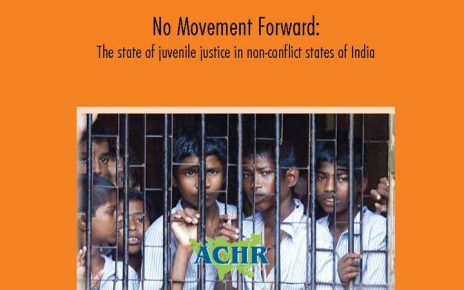Available at The Tribune
03 June 2019
Despite signing the UNCAT in 1997, India has not ratified it, due to which getting fugitives extradited from foreign countries also becomes difficult
The alleged custodial death of a 58-year-old man at the Bawana police station in Delhi has once again brought to the fore the inhuman face of the police in India. Victim Balraj, who was called for questioning, allegedly jumped to death from the third floor of the police station late last month. Like in most such cases, the National Human Rights Commission (NHRC) issued a notice to the Delhi Police Commissioner and sought explanation.
India has been notorious for custodial deaths—both in police custody and judicial custody (i.e. in jails).
In March 2013, December 16, 2012, gang-rape accused Ram Singh (35) died under mysterious circumstances in Tihar Jail. He allegedly hanged himself from the cell’s ceiling using a rope.
Biscuit tycoon Rajan Pillai died under mysterious circumstances in the same jail in July 1995, but the jail authorities had then attributed his death to liver cirrhosis.
In October 2009, Ghaziabad PF scam main accused Ashutosh Asthana died in October 2009 in mysterious circumstances in Dasna Jail, near Ghaziabad.
Lucknow Deputy Chief Medical Officer Dr YS Sachan, who was an accused in the murder of two chief medical officers, was found dead in a toilet in Lucknow jail in June 2011. It was alleged that these deaths had connection with the National Rural Health Mission scam.
The Ministry of Home Affairs informed Parliament in April 2018 that during 2016-17, 1,616 persons had died in judicial custody and 145 in police custody while the figure for 2017-18 was 1,530 and 144, respectively.
According to Asian Centre for Human Rights (ACHR), on an average, five Indians died in custody every day between April 2017 and February 2018. Based on figures placed by the Ministry of Home Affairs in the Rajya Sabha on March 14, an ACHR report, titled “Torture Update India”, released last year said 1,674 custodial deaths (1,530 in judicial and 144 in police custody) occurred between April 2017 and February 2018. The figure was higher than average four custodial deaths a day from 2001 to 2010.
UP topped the list with 374 custodial deaths, followed by Maharashtra (137), West Bengal (132), Punjab (128), Madhya Pradesh (113), Bihar (109), Rajasthan (89), Tamil Nadu (76), Gujarat (61), Odisha (56), Jharkhand (55), Chhattisgarh (54), Haryana (48), Delhi (47), Assam (37), Andhra Pradesh (35), Uttarakhand and Telangana (17 each), Karnataka (15), HP (8), Arunachal Pradesh and Tripura (six each) and Chandigarh and Sikkim (two each).
Contrary to popular perception, insurgency-hit states such as Jammu and Kashmir and Meghalaya (four such deaths each), Mizoram (three), Manipur, and Nagaland (two each) reported considerably lower number of custodial deaths. These deaths raise serious question about the manner in which the police in India deal with civilians in custody—police or judicial.
It’s a common knowledge that police don’t treat citizens with dignity and respect they deserve in a democratic society. But what is surprising is the absence of outrage in the media and civil society against custodial deaths. It’s a pointer to the fact that India has yet to build a culture of human rights where civilians are not subjected to inhuman torture by the police.
The NHRC has issued certain guidelines to deal with custodial deaths, but its intervention rarely goes beyond the routine issuance of notice and order for compensation to the affected family, leading to a culture of impunity.
Despite signing the UN Convention Against Torture and Other Cruel, Inhuman or Degrading Treatment or Punishment (UNCAT) in 1997, India has not ratified it. At least three South Asian nations — Bangladesh, Nepal and Sri Lanka — have ratified UNCAT and enacted laws against torture. But so far, India doesn’t have a law against torture, which is often cited by fugitive offenders such as Vijay Mallya, Purulia arms-dropping case accused Kim Davy and others to frustrate New Delhi’s attempts to extradite them to face the law.
The Law Commission on October 30, 2017, submitted its 273rd report on the “Implementation of United Nations Convention against Torture and other Cruel, Inhuman and Degrading Treatment or Punishment” to the government along with a draft “The Prevention of Torture Bill, 2017”. An earlier Bill introduced in 2010 and sent to a select committee had lapsed.
One hopes the new government will take up the issue on priority. What is needed are not just legislative measures, but also proper training to police personnel on human rights so as to ensure that the culture of custodial violence ends in India.




